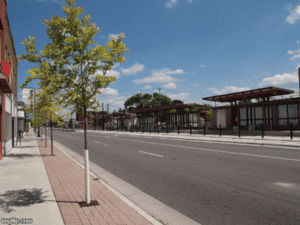
Difference between revisions of "Trees"
m |
m (→Urban Forestry) |
||
| (99 intermediate revisions by the same user not shown) | |||
| Line 1: | Line 1: | ||
| − | + | [[File:mids logo.jpg|300px|right|alt=image of Minimal Impact Design Standards logo]] | |
| − | < | + | {{alert|Trees can be an important tool for retention and detention of stormwater runoff. Trees provide additional benefits, including cleaner air, reduction of heat island effects, carbon sequestration, reduced noise pollution, reduced pavement maintenance needs, and cooler cars in shaded parking lots.|alert-success}} |
| − | + | ||
| − | < | + | {{alert|Tree trenches and tree boxes are [[Bioretention|bioretention]] practices. However, because of differences in design, construction and maintenance, we have created a separate section for trees.|alert-info}} |
| − | + | ||
| − | + | [[file:Check it out.png|200px|left|thumb|alt=image|<font size=3> | |
| − | + | *The tree interception credit has been updated. [https://stormwater.pca.state.mn.us/index.php?title=File:Tree_Performance_Memo.docx See the technical memo] | |
| − | < | + | *[http://www.deeproot.com/blog/?utm_medium=email&utm_campaign=DeepRoot%20Newsletter%20July%202019&utm_content=DeepRoot%20Newsletter%20July%202019%20CID_930020a63aca598a8c6d4fdb513662ab&utm_source=Email This blog site] has numerous blogs that may be of interest.</font size>]] |
| − | + | ||
| − | + | [[File:Tree_trenches.gif|right|300px|alt=image of tree trenches]] | |
| − | + | ||
| − | + | Use of trees to manage stormwater runoff encompasses several practices. Tree trenches and tree boxes (collectively called tree BMPs), the most commonly implemented tree BMPs, can be incorporated anywhere in the stormwater treatment train but are most often located in upland areas of the treatment train. | |
| − | + | ||
| + | Tree BMPs are one component of urban forestry. Urban forestry is a broad term that applies to all publicly and privately owned trees within an urban area, including individual trees along streets and in backyards, as well as stands of remnant forest (Nowak et al. 2001). This page includes three sections covering [http://stormwater.pca.state.mn.us/index.php/Trees#General_information_on_trees general information about trees], [http://stormwater.pca.state.mn.us/index.php/Trees#Tree_trenches_and_tree_boxes tree trenches and tree boxes as BMPs], and [http://stormwater.pca.state.mn.us/index.php/Trees#Urban_Forestry urban forestry]. | ||
| + | |||
| + | <font size=5>[[Acknowledgements for trees|Acknowledgements]]</font size> | ||
| + | |||
| + | ==General information on trees== | ||
| + | *[[Overview for trees]] | ||
| + | *[[Types of tree BMPs]] | ||
| + | *[[Plant lists for trees]] | ||
| + | *[[Street sweeping]] - this page provides a summary of an on-going project to develop a street sweeping credit | ||
| + | *[[Street sweeping for trees]] | ||
| + | *[[References for trees]] | ||
| + | *[[Supporting material for trees]] | ||
| + | *[[Neat websites and articles for trees]] | ||
| + | *[[Links to tree ordinances and forest management master plans]] | ||
| + | *[[Green Infrastructure benefits of tree trenches and tree boxes]] | ||
| + | |||
| + | ==Tree trenches and tree boxes== | ||
| + | *[[Design guidelines for tree quality and planting - tree trenches and tree boxes]] | ||
| + | *[[Design guidelines for soil characteristics - tree trenches and tree boxes]] | ||
| + | *[[Construction guidelines for tree trenches and tree boxes]] | ||
| + | *[[Protection of existing trees on construction sites]] | ||
| + | *[[Operation and maintenance (O&M) of tree trenches and tree boxes]] | ||
| + | *[[Operation and maintenance of tree trenches and tree boxes - supplemental information]] | ||
| + | **[[Operation and maintenance of tree trenches and tree boxes]] - we recommend using one of the above two pages | ||
| + | *[[Assessing the performance of tree trenches and tree boxes]] | ||
| + | *[[Calculating credits for tree trenches and tree boxes]] | ||
| + | *[[Case studies for tree trenches and tree boxes]] | ||
| + | *[[Soil amendments to enhance phosphorus sorption]] | ||
| + | *[[Green Infrastructure benefits of tree trenches and tree boxes]] | ||
| + | *[[Summary of permit requirements for infiltration]] | ||
| + | *[[Tree trench/box photo gallery]] | ||
| + | <!-- | ||
| + | *[[Design variants for tree trenches and tree boxes]] | ||
| + | *[[Construction observations for tree trenches and tree boxes]]--> | ||
| + | *[[Fact sheet for tree trenches and tree boxes]] | ||
| + | *[[Requirements, recommendations and information for using trees as a BMP in the MIDS calculator]] | ||
| + | *[[Requirements, recommendations and information for using trees with an underdrain as a BMP in the MIDS calculator]] | ||
| + | |||
| + | ==Links to tables with tree information== | ||
| + | *[[Tree species list - general information]] | ||
| + | *[[Tree species list - morphology]] | ||
| + | *[[Tree species list - tolerance to stresses]] | ||
| + | *[[Tree species list - pH and moisture ranges]] | ||
| + | *[[Tree species list - tolerance to inundation]] | ||
| + | *[[Tree species list - additional benefits]] | ||
| + | *[[Tree species list - notes]] | ||
| + | *[[Tree species list - Suitable for CU structural soil]] | ||
| + | *[[Tree health troubleshooting guidelines]] | ||
| + | |||
| + | ==Urban Forestry== | ||
| + | For more information on urban forestry, we suggest visiting the following websites. | ||
| + | *[https://www.fs.usda.gov/managing-land/urban-forests/ucf Urban and Community Forestry] - USDA Forest Service | ||
| + | *[http://www.mayorsfundphila.org/initiatives/urban-forest/ Urban Forestry & Ecosystem Management] - City of Philadelphia | ||
| + | *[https://allaboutwatersheds.org/library/watershed-forestry-resource-guide Watershed Forestry Resource Guide] - Center for Watershed Protection and US Forest Service - Northeastern Area State & Private Forestry | ||
| + | *[https://www.americanforests.org/ American Forests] | ||
| + | *[http://urbanforestry.frec.vt.edu/ Urban Forestry] - Virginia Tech University | ||
| + | *[http://water.epa.gov/polwaste/green/upload/stormwater2streettrees.pdf Stormwater to Street Trees: Engineering Urban Forests for Stormwater Management] - U.S. EPA | ||
| + | *[https://greenstep.pca.state.mn.us/ Green Step Cities]. This page provides a summary of urban forestry practices that cities can implement to help become a [http://greenstep.pca.state.mn.us/bestPractices.cfm Green Step City] and a list of cities that are implementing the practices, including links. | ||
| + | |||
| + | ==Related pages== | ||
| + | *[[Understanding and interpreting soils and soil boring reports for infiltration BMPs]] | ||
| + | *[[Determining soil infiltration rates]] | ||
| + | |||
| + | <noinclude> | ||
| + | [[Category:Level 3 - Best management practices/Structural practices/Tree trench and box]] | ||
| + | </noinclude> | ||
Latest revision as of 11:42, 26 January 2023

Use of trees to manage stormwater runoff encompasses several practices. Tree trenches and tree boxes (collectively called tree BMPs), the most commonly implemented tree BMPs, can be incorporated anywhere in the stormwater treatment train but are most often located in upland areas of the treatment train.
Tree BMPs are one component of urban forestry. Urban forestry is a broad term that applies to all publicly and privately owned trees within an urban area, including individual trees along streets and in backyards, as well as stands of remnant forest (Nowak et al. 2001). This page includes three sections covering general information about trees, tree trenches and tree boxes as BMPs, and urban forestry.
Contents
General information on trees
- Overview for trees
- Types of tree BMPs
- Plant lists for trees
- Street sweeping - this page provides a summary of an on-going project to develop a street sweeping credit
- Street sweeping for trees
- References for trees
- Supporting material for trees
- Neat websites and articles for trees
- Links to tree ordinances and forest management master plans
- Green Infrastructure benefits of tree trenches and tree boxes
Tree trenches and tree boxes
- Design guidelines for tree quality and planting - tree trenches and tree boxes
- Design guidelines for soil characteristics - tree trenches and tree boxes
- Construction guidelines for tree trenches and tree boxes
- Protection of existing trees on construction sites
- Operation and maintenance (O&M) of tree trenches and tree boxes
- Operation and maintenance of tree trenches and tree boxes - supplemental information
- Operation and maintenance of tree trenches and tree boxes - we recommend using one of the above two pages
- Assessing the performance of tree trenches and tree boxes
- Calculating credits for tree trenches and tree boxes
- Case studies for tree trenches and tree boxes
- Soil amendments to enhance phosphorus sorption
- Green Infrastructure benefits of tree trenches and tree boxes
- Summary of permit requirements for infiltration
- Tree trench/box photo gallery
- Fact sheet for tree trenches and tree boxes
- Requirements, recommendations and information for using trees as a BMP in the MIDS calculator
- Requirements, recommendations and information for using trees with an underdrain as a BMP in the MIDS calculator
Links to tables with tree information
- Tree species list - general information
- Tree species list - morphology
- Tree species list - tolerance to stresses
- Tree species list - pH and moisture ranges
- Tree species list - tolerance to inundation
- Tree species list - additional benefits
- Tree species list - notes
- Tree species list - Suitable for CU structural soil
- Tree health troubleshooting guidelines
Urban Forestry
For more information on urban forestry, we suggest visiting the following websites.
- Urban and Community Forestry - USDA Forest Service
- Urban Forestry & Ecosystem Management - City of Philadelphia
- Watershed Forestry Resource Guide - Center for Watershed Protection and US Forest Service - Northeastern Area State & Private Forestry
- American Forests
- Urban Forestry - Virginia Tech University
- Stormwater to Street Trees: Engineering Urban Forests for Stormwater Management - U.S. EPA
- Green Step Cities. This page provides a summary of urban forestry practices that cities can implement to help become a Green Step City and a list of cities that are implementing the practices, including links.
Related pages
This page was last edited on 26 January 2023, at 11:42.

